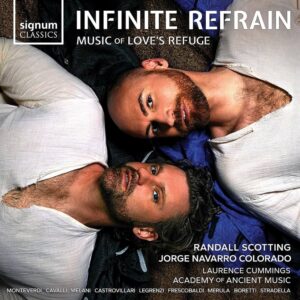
CD Review: Signum Classics’ ‘Infinite Refrain: Music of Love’s Refuge’
By Bob DieschburgAmerican Randall Scotting has made a name for himself both as an authority on Italian Baroque music and as one of its most exquisitely timbered interpreters. The countertenor has in the past year alone released two albums, “The Crown” and “Lovesick,” a 17th century anthology about loss and heartbreak.
With “Infinite Refrain: Music of Love’s Refuge” he joins forces with tenor Jorge Navarro Colorado to explore facets of gay romance in Venice’s early period of Enlightenment. The album was published by Signum Classics and is conducted by Laurence Cummings at the helm of the Academy of Ancient Music.
Forbidden Love
As is by now customary for his releases, the track list sports a mix of rather familiar arias, duets, as well as complete unknowns, the preparation of which, to Scotting, is an archeological labor of love.
There is, for instance, a hauntingly intimate rendition of Monteverdi’s “Pur ti miro” which appears in fresh guise by being sung by two men instead of a countertenor and a soprano. The maestro from Cremona is most prominently represented, as nearly half of the album’s tracks bear his authorship.
In addition, his (near-)contemporaries Jacopo Melani, Tarquinio Merula, Daniele da Castrovillari, Francesco Cavalli, Girolamo Frescobaldi, Alessandro Stradella, and Giovanni Legrenzi are each included to form a wide ranging musical fresco of humanist Venice.
Among the four premiere recordings, the duet of “Entro l’orrida mole… Se per tè lieto mi lice” deserves special mention. Written by Giovanni Antonio Boretti, whose operas all premiered in the Venetian Republic, it is a strikingly beautiful declaration of same-sex love between Hercules and Theseus who make the mutual promise that “questa vita, o caro, è tua non mia,” “my life, oh beloved, belongs to you and not me.”
It may well be the CD’s most open proclamation of gay love.
“In genere rappresentativo”
With Scotting and Navarro Colorado the UK-based label has enrolled two experts in the Baroque repertory whose warmly timbered voices complement each other quite marvelously.
The duets are tenderly sung, full of emotional nuance yet in strict obedience to notational intricacies. For instance, the progression from Theseus’ bewilderment to his love confession in Boretti’s “Ercole in Tebe” is a sheer delight; control over the messa di voce allows both singers to cover the whole spectrum of psychological expression.
Individually, and on a technical level, the tracks may be less demanding than Scotting’s selection of arias for “The Crown” which were chosen to emulate the virtuosity of the legendary castrato Senesino. However, “Infinite Refrain” holds its own set of challenges as its emphasis lies on love, and a potentially forbidden one at that.
The fervent but no less introspective adoration of the “Lettere amorose,” for example, is hard to navigate. In the recitativo-like introduction to “Se i languidi miei sguardi” our countertenor relies on delicate chiaroscuro modulations to infuse the line with amorous sentiment.
Similarly, Navarro Colorado strikes the right balance in approaching the overwhelming directness of its counterpiece, “Se pur destina e vole.” The Mediterranean warmth of his tenor accords well with Monteverdi and Ottavio Rinuccini’s dramatic flight of ideas. After all, the “Lettere” are monodic compositions “in genere rappresentativo,” that is with a decidedly theatrical intent.
A Baroque Labor of Love
Two instrumental interludes, the “Ballo detto Pollicio” and the “Ballo del Granduca,” provide for some variation; the former was written by Tarquinio Merula who – the excellent booklet informs us – was charged with indecency, likely because of his sexual orientation.
They give credit to conductor Laurence Cummings and the Academy of Ancient Music whose connoisseurship of period-instruments and techniques transpires on every track.
In short, “Infinite Refrain” upholds Signum Classics’ commitment to the Baroque Age as it aligns with Scotting’s earlier releases on the British label. It showcases some little known but no less charming discoveries while pairing two of the repertoire’s most outstanding singers.


